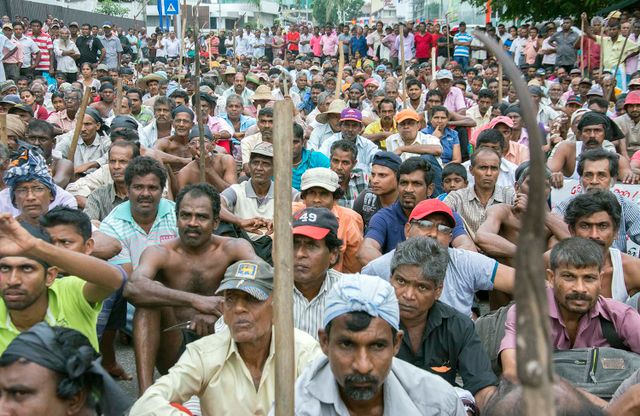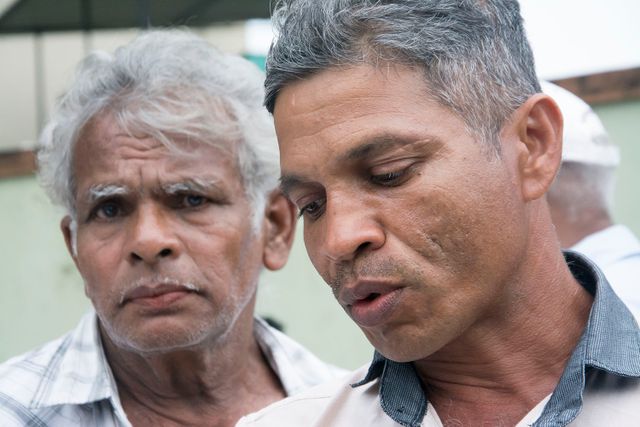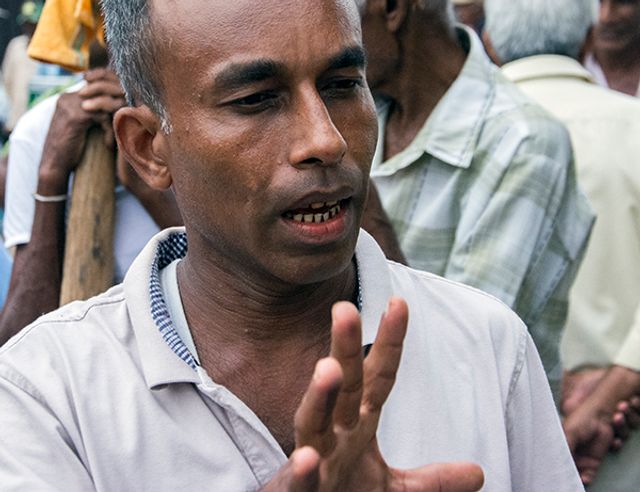Andre Vltchek
White foam, kitschy lights and embarrassing computer generated melodies. Year after year, the same crap. Not tired yet?
Christian families gather; they perform rituals, exchange gifts. All this is taking place under the crucifixion, which has been elevated to the reason, justification and excuse for the most intense, long-lasting and on-going slaughter of human beings in the history of mankind.
Hundreds of millions, all over the world, have died so that “the message of Jesus” could live. Millions are still dying now, so that Christian fundamentalists can manipulate, rule and plunder the world, unopposed.
Those neocons, the neo-colonialists, and Western exceptionalists/supremacists – are all comfortably seated in their saddles, as in the days of the Spanish Inquisition, or the insane reign of Calvin.
Aren’t all the mountain ranges of corpses and vast oceans of blood really enough?
The snow, real and chemical, is soaked in red – a deep-red color.
***
Year after year, I monitor the crimes against humanity committed by these Christian “warriors”. I monitor and report. For many years I have observed and written down my findings.
2015 has been full of “great Christian deeds” – again!
Throughout this year, the Christian fundamentalist West continued derailing what was left of socialist Islam, manufacturing, funding and arming various grotesque factions and armies, including ISIS. During the conference I attended in Teheran this year, I was told by two Muslim scholars and philosophers, that Washington, London and Paris have managed to “create a totally new religion” that has nothing to do with the original and socially-oriented Islam. As a result, in 2015 alone millions have been displaced and tens of thousands are dying.
As in the middle ages, attacked and destabilized Muslim countries are collapsing, sending millions of refugees to all corners of the globe. Further millions are internally displaced.
Tiny Lebanon has now over 2 million refugees from both Syria and Iraq, and Russia has over one million people fleeing both Ukraine and the Middle East.
After bloodsucking all over the world, particularly the Middle East and Africa, the West “just cannot take more refugees”. This is what it says! The entire West cannot accommodate one million people, after robbing and raping all the continents of our Planet.
Oh that poor, stressed and overwhelmed Christian West! It is so, so charitable, so kind, so bloody civilized, but it just cannot do anything to help those hordes flooding into its castle from the east and the south! We should all understand and sympathize!
Of course, its theaters, parks, train stations, schools, social systems are all built on the corpses of hundreds of millions, scattered across all continents. Its “culture” is constructed on what was directly robbed from the Arab world, Persia, China and those great American civilizations before they were ruined by the Western holocausts. The only reason why the Christian West prospered and won countless colonialist battles is because it behaved like a beast, a true animal, in short: like the most brutal and barbarous thug on the face of the Earth. Progress? What progress? “Progress” towards what? It was all just pure Christian fundamentalist degeneracy. And it still is. Even the so-called ‘secular’ and ‘non-religious’ West is essentially resting on the pillars of Christian dogma, expansionism and deep-rooted complexes of superiority.
“Stop the refugees!” voices are heard. “Stop the Muslims!” And loudest of all come the shouts: “Stop the terrorists!”
Twisted Christian dogma helps with the best propaganda on earth: that of the West. Their bottom line reads like this: “We kill millions of your people, bomb your cities to the ground, but if some other guys blow a few bombs and kill a few hundred people annually, that justifies our war on terror.”
You see, a Westerner, or a Christian, can never be a terrorist. Even such a thought is forbidden.
Yes, rob and kill and rule, but all that has to be done remotely, long-distance. That is the Christian way. And remember: you slap our face and we will… offer you another cheek? Get real! In your dream, dude! We will nuke your cities!
After destabilizing dozens of countries, so that the bloody mess could further serve its neo-colonialist designs, the Christian West is now sending armies to push those debilitated millions of poor, starving people escaping Libya, Syria and other countries, far away from the proximity of its refined churches, perfumed department stores and glowing Christmas markets.
What a spectacle of that fabled Christian charity! What humility and kindness!
You loot, rape and torture, and then you throw a few crumbs across the barbed wire, at those whose natural resources made your social systems and obnoxious subsidies so lavish.
If someone protests, you shoot. If some government resists, you overthrow it. And then you yell: stay away, you rugged hordes!
Your people elect near fascist governments, just in order to prevent some pseudo-leftist politician from applying at least a bit of internationalist policies.
Oh, what a ride it was, this year, for true Christianity!
***
I witnessed the entire Central Asia going up in flames, after thousands of Western-backed NGOs began spreading nationalist, racist and divisive ideologies. A man from Kyrgyzstan, a moderate Muslim scholar whom I was supposed to meet, was stabbed countless times by ISIL, just a few days before I landed in Bishkek.
As in Oceania, Africa, Latin America and Asia, the Christian preachers were injected (by the West) into the complex Central Asian cultural fabric, in order to destroy peace and understanding between the various ethnic and religious groups.
From where the hell is the West managing to get so many of those militant, aggressive, thoroughly degenerate preachers, priests and clerics? They seem to be growing on some ancient colonial plantations before being transplanted into all the continents of the Earth!
Primitive, constantly at war with the poor are these hateful, Economist-reading, Voice of America-listening clerics.
How to neutralize them? How to get rid of them? During and after their revolutions, the French and then the Russians used to hang them on streetlamps. It is not done like this, anymore. The Empire reserves the right for itself and for its lackeys to lie, agitate, brainwash and poison. As long as these treasonous preachers are defending Western Christian doctrine, colonialism and capitalism, they are extremely well protected!
***
In 2015, the Christian right wing deeply damaged our revolutions all over Latin America.
It continues to batter China, through the religious implants sent to it from all over East Asia and elsewhere.
Extreme right-wing preachers and agents from the United States, Europe, Australia and Canada keep invading countries like Indonesia, as well as virtually all the nations of Africa and Oceania.
In the Democratic Republic of Congo, true beasts, warlords/Christian fundamentalist preachers, are exterminating their own citizens on behalf of Western multi-national companies and governments. Since 1995, the DRC has lost around 10 million people.
***
Lately, one “Christian episode” from my youth keeps coming to my mind.
Just a few weeks after arriving in the US, I took a train from New York City to Washington D.C., to see the Capital. I spent several hours hanging around the place, terrified by the open, unconcealed misery so clearly visible only a few minutes from the landmark government buildings and monuments.
On the way back, it was almost dark in the Amtrak carriage, as the train was slowly making its way back to New York.
Next to me sat a Polish priest. “I am a visiting priest”, he told me at the beginning of the journey. “And I am an anti-Communist.”
A few minutes after the Baltimore stop, he began molesting me.
His insane face was twisted by lust. He was breathing heavily. His hands kept grabbing me, searching for the zipper of my fly.
I pushed him away, but he kept whispering vile stuff in Polish.
I stood up and did the only sensible thing: I punched him straight in his face, with all my strength.
His nose began to bleed.
When the conductor passed through the car, the priest ran to him and complained that I had attacked him.
That’s how they used to run their “anti-Communist struggle back home”, I thought. Molest and then run to the West, complaining and whining.
The conductor was a reasonable, good-humored African-American man. I explained to him what had in fact happened. He trusted me, and he seated me somewhere else. “I was molested in my church on several occasions”, he uttered, patting my shoulder.
A few minutes later, the priest approached my seat. A maniacal expression on his face, he grabbed my arm and whispered: “Pray! Pray with me!”
He knelt between the seats and began praying.
I almost hit him again, but I didn’t. I would, if something like this happened now.
Because now, I clearly understand that this is exactly how they run the world: they molest and rape, they rob and when caught, they lie, pretending that they committed no crime. And they force people they harmed to succumb to their vision of the world, to their religion. Their criminal dogma is supposed to be utilized for healing and “redemption” purposes.
What a sick world they have been creating!
“Our dogmas, our religion, raped you. Pray to it for your salvation!” Bastards!
***
Among other reasons, this year of 2015 was significant because I accepted the invitation to speak at the philosophical Whitehead conference in Southern California, where I met, once again, my friend and perhaps the greatest living Christian theologian John Cobb.
I challenged him and he accepted. For several hours we debated Christianity, and the reasons why this religion is so closely linked with imperialism, colonialism, capitalism and all forms of manipulation, extermination and torture of human beings.
The results of our discussion will be converted into a slim book that will be published in 2016 by Badak Merah.
***
If the discussion about all the horrors committed by Christianity could ever reach some rational or even philosophical level, the main argument of the apologists would always be the same: “It is not really the Bible, or Jesus, or Christianity itself that should be blamed for those hundreds of millions of lost lives, for the entire continents consumed by flames, for the theft and rape of entire great civilizations. Oh no, not Christianity! It is those “bad Christians” who should be held liable.”
Such arguments are thoroughly banal, as they are insulting. Logically, responsible are both people and the dogma!
All religions are man-made, including Christianity. Christianity is, of course, a result of imperfect and archaic human thinking.
It is clear that there is plenty encoded in Christianity that has been able to trigger the greatest crimes against humanity, committed, again and again, until this very moment.
Had Christianity not been a religion but a political movement, it would have been banned a long time ago, simply due to its reoccurring genocidal behavior.
If for another few decades we just study and analyze and look for theoretical and philosophical answers, without stopping this monstrous dogma, Christianity could easily devour another 10 or 20 million human lives! Based on its track record, it easily could. It could continue to swallow entire nations, while yelling, lying and pointing fingers at all directions, calling the poor, the Muslims and the Communists, the true dangers and menaces to the world!
Then, each year, each hypocritical “Merry Christmas”, we will be counting victims and measuring cubic liters of blood, spilled on that real and chemical “virgin” snow!



